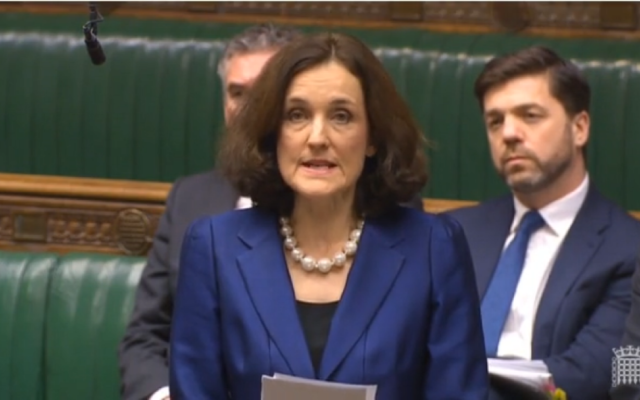UK is first country to allow museums to ‘indefinitely’ return Nazi-looted art
Scheme to return objects stolen by the Nazis during the Holocaust is at third hearing, which aims to retain a 2009 law before it lapses

The UK has become the first country in the world to allow its national museums to “indefinitely” return artwork looted from Jewish families during the Nazi era.
The landmark move follows a debate in the House of Commons on Friday, as MPs agreed to get rid of the ten-year “sunset clause” within the Holocaust (Return of Cultural Objects) Act 2009.
This means that 17 national institutions can continue returning property lost, seized, stolen or looted during the Nazi era to the original owner’s descendants.
Critics have said routes for claiming lost art “are available only to the rich” and that returning the art “deprives the general public of an opportunity to see these priceless works of art” but the Bill commanded strong cross-party support and passed with ease.
“The 2009 Act is still needed,” said MP Theresa Villiers, explaining that it over-rides the governing statutes of national museums. These legal statutes prohibit the institution from returning property seized by the Nazis, even if the institution believes that the claim has merit and wants to return the item to the heirs of the original owner.
“This Bill will enable national museums to return Nazi looted works of art indefinitely,” said Anne Webber, co-chair of the Commission for Looted Art in Europe, based in London. “There is no other country which has made such a commitment.”
The UK’s world-leading stance stands in stark contrast to the record of Germany in returning Nazi-looted art, she said, highlighting an example this week “which revealed that previously hidden and shameful history of the Germans having returned looted art to the Nazis who had taken it”.
In September 2017, the UK Government said it would live up to commitments made in Washington 18 years earlier, when 44 countries pledged to work for the restoration of property seized during the Holocaust, and Webber said British families were benefiting.
“There are many families in the UK who have recovered works of art or who are still trying to find their looted works of art or who are awaiting their return,” she said. “We have hundreds of missing paintings which we’re looking for on behalf of such families. We also have claims in process on their behalf.”
During the parliamentary debate, Villiers paid tribute to Webber and the Commission “for its excellent efforts in trying to secure fair outcomes in cases of this nature”.
She said the art’s return to Jewish families was significant because of “the emotional value of being reunited with an object treasured by a loved one who died in the Holocaust, and that a lost relative had held in their hands and valued”.
She listed examples such as “books owned by a much-loved grandmother, a painting given by a claimant’s grandparents to his parents or a favourite painting that used to hang on the dining room wall of a family home,” adding: “The Nazi regime engaged in systematic confiscation, looting and theft from Jewish people.”

Thank you for helping to make Jewish News the leading source of news and opinion for the UK Jewish community. Today we're asking for your invaluable help to continue putting our community first in everything we do.
For as little as £5 a month you can help sustain the vital work we do in celebrating and standing up for Jewish life in Britain.
Jewish News holds our community together and keeps us connected. Like a synagogue, it’s where people turn to feel part of something bigger. It also proudly shows the rest of Britain the vibrancy and rich culture of modern Jewish life.
You can make a quick and easy one-off or monthly contribution of £5, £10, £20 or any other sum you’re comfortable with.
100% of your donation will help us continue celebrating our community, in all its dynamic diversity...
Engaging
Being a community platform means so much more than producing a newspaper and website. One of our proudest roles is media partnering with our invaluable charities to amplify the outstanding work they do to help us all.
Celebrating
There’s no shortage of oys in the world but Jewish News takes every opportunity to celebrate the joys too, through projects like Night of Heroes, 40 Under 40 and other compelling countdowns that make the community kvell with pride.
Pioneering
In the first collaboration between media outlets from different faiths, Jewish News worked with British Muslim TV and Church Times to produce a list of young activists leading the way on interfaith understanding.
Campaigning
Royal Mail issued a stamp honouring Holocaust hero Sir Nicholas Winton after a Jewish News campaign attracted more than 100,000 backers. Jewish Newsalso produces special editions of the paper highlighting pressing issues including mental health and Holocaust remembrance.
Easy access
In an age when news is readily accessible, Jewish News provides high-quality content free online and offline, removing any financial barriers to connecting people.
Voice of our community to wider society
The Jewish News team regularly appears on TV, radio and on the pages of the national press to comment on stories about the Jewish community. Easy access to the paper on the streets of London also means Jewish News provides an invaluable window into the community for the country at large.
We hope you agree all this is worth preserving.





















